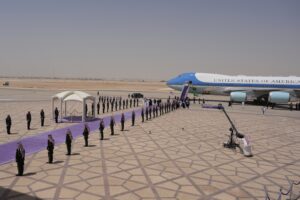
The National Interest Foundation Newsletter
Issue 286, May 16, 2025
Welcome to our NIF Newsletter. In this week’s edition, we provide analysis on President Trump’s Middle East trip which focused heavily on luring investments and business deals, examine how Israel has accelerated its indiscriminate killing of civilians in Gaza after the release of Edan Alexander, and look into the importance of what the lifting of U.S. sanctions would mean for Syria.
Editor: Bassam Tarbush
Trump’s Middle East Trip Focuses Heavily on Luring Investments and Business Deals

President Trump’s Middle East trip this week consisted of stops in Saudi Arabia, Qatar, and the United Arab Emirates. (Photo from AP)
This week, U.S. President Donald Trump embarked on a multi-day trip to the Middle East which included visits to the three Gulf nations of Saudi Arabia, Qatar, and the United Arab Emirates (UAE). This marked Trump’s first major foreign trip of his second term in office, and was largely focused on luring investments and business deals with the aforementioned countries. However, one of the most momentous things to come out of the trip was related to Syria. While speaking at a forum during the first leg of the trip in Saudi Arabia, Trump announced that the United States would remove all of its sanctions on Syria – a much-welcomed development as observers had been highlighting the need for and importance of this since the ousting of the repressive Assad regime back in December of last year. As many have pointed out, sanction relief gives Syria’s delicate political transition the best chance to succeed and should be provided given that the measures were put in place as a means of punishing the country’s previous dictatorial regime – which is now no longer in power. The removal of sanctions would also help pave the way for much-needed economic recovery and, it is hoped, increase the prospects of stability and inclusivity.
Other than the surprising announcement regarding the intention to remove U.S. sanctions on Syria and a landmark gathering with the country’s new leader Ahmed al-Sharaa – which represented the first time in 25 years that leaders of the two respective nations meet, much of Trump’s trip was concentrated on securing a series of strategic deals and investments with the Gulf nations that he visited. The American president’s time in Saudi Arabia included the unveiling of new Saudi investments in energy production, technology, and artificial intelligence, as well as a massive $142 billion weapons deal. Some analysts have suggested that the focus on securing huge investments seems largely motivated by the Trump administration’s desire to gain the upper hand in its ongoing trade standoff and technological competition with China. It is also consistent with the type of transactional approach to diplomacy and foreign policy that political commentators have come to expect from the current U.S. administration. Worth noting however as well is the fact that details regarding some of the specific financial commitments have remained vague, and some of the programs began under the previous administration of President Biden. This is similar to what took place during Trump’s first term back in 2017, when fact-checkers and experts noted that most of the publicly announced items stemming from his trip to Saudi Arabia had been previously announced by the Obama administration. As such, these numbers and figures should often be “taken with a grain of salt.” While on the second leg of his trip, Trump became the first U.S. president to make an official state visit to Qatar. There, the American president met with Qatar’s Emir Sheikh Tamim bin Hamad Al Thani, and the White House announced that the U.S. and Qatar had signed deals worth at least $1.2 trillion – including a major transaction that would see Qatar Airways buy 210 aircraft from American company Boeing. Other agreements consisted of Qatar purchasing drone and anti-drone technology from U.S. defense companies and investments in the American energy sector.
Even beyond the aim of deepening economic and business ties though, it is evident to experts that Trump has come to see the Gulf countries he visited as key diplomatic and strategic partners, both in the region and overall. This has been demonstrated by their participation on various pressing contemporary issues such as Saudi involvement in hosting talks on Russia-Ukraine and Qatar’s position as a key mediator regarding the Gaza War. It is telling with respect to the state of American foreign policy under Trump’s second term that his administration views these Gulf nations in particular – and not the United States’ most traditional allies in Europe and North America – as critical partners, and hence worthy of his first main overseas trip following his return to the White House. In fact, commentators have highlighted how prior to Trump’s first term in office, American presidents dating back to the end of World War II normally made their first foreign visit to one of the United States’ two North American neighbors (Canada or Mexico) or a major ally in Europe. Thus, this clear shift under Trump emphasizes his administration’s heightened interest in the region, with an enormous focus placed on the strengthening of economic and strategic ties through the penchant for dealmaking.
Trump’s decision not to visit Israel on the regional trip was an observation of note to analysts as well. It aligns with the growing belief that ties between the American president and Israeli Prime Minister Netanyahu have deteriorated, as the Trump White House has become increasingly unhappy that Netanyahu is intent on perpetuating the Gaza War. Many have outlined how Trump has made it clear that he wants to be viewed as a peacemaker, going as far as divulging that one of his ambitions is to win a Nobel Peace Prize, and thus Netanyahu’s warmongering runs counter to this. It is no secret that President Trump came into office for his second term promising to end the longstanding conflicts in Gaza and Ukraine as two of his main foreign policy goals, and it appears as though him and members of his administration are beginning to acknowledge the hugely obstructive role that Netanyahu is playing in derailing the efforts to put an end to the destructive Gaza War.
Israel Accelerates Its Indiscriminate Killing of Civilians in Gaza After the Release of Edan Alexander

Israel has intensified its deplorable bombardment of Gaza even after the release of Alexander. (Photo from Reuters)
The release of hostage soldier Edan Alexander as a result of U.S. officials’ direct negotiations with Hamas was a notable development this week in several ways. Most importantly, it was hoped that it would spark renewed momentum regarding the prospects of initiating a ceasefire and putting an end to Israel’s destructive war in Gaza, with the aim that it would serve as a significant and positive step forward in this process. For many observers, it was also proof though of the growing rift between the Trump administration and the Israeli government under Netanyahu. It speaks volumes about the United States’ increased willingness to act independently – and in many cases privately – without coordination with Israel, in its dealings in the Middle East. Evidence of this was on full display last week as well when Trump announced a ceasefire deal with the Houthis, catching Israeli officials completely off guard. Trump officials, and even the president himself, have voiced disagreement behind the scenes regarding Israel’s detrimental desire to expand its war efforts in Gaza and are becoming frustrated with their refusal to reach a new ceasefire and hostage release deal. With the release of Alexander, Hamas is signaling that it is committed to reaching a comprehensive final agreement for a permanent ceasefire and end to the Gaza War, and thus, mounting the pressure on Israel to cease its military offensive and egregious blockade on humanitarian aid – including, crucially, from the Trump administration.
The extent of the friction between U.S. and Israeli officials has been exhibited by the Trump administration’s recent actions sidelining Israel’s interests, including its pursuit of nuclear diplomacy with Iran and direct talks with both Hamas and the Houthis. Netanyahu’s positions have not only garnered rising disapproval from those within the current U.S. government like Trump’s Middle East envoy Steve Witkoff – who recently told a group of former hostages and relatives of those still held in Gaza that Israel is drawing out a conflict that the United States wants to end – but they have also led to consistently high levels of opposition domestically, with many shedding light on his clear prolonging of the Gaza War for political reasons. There is widespread support inside Israel for ending the war in return for the release of all remaining hostages, as opinion polls show that more than two-thirds of citizens back a deal. Netanyahu has long been facing the fury of hostage families and their supporters, who see that he is refusing to put an end to hostilities for personal political considerations. While this has been apparent to these individuals in addition to various human rights and peace advocates for some time, things have now reached a point where more and more can no longer deny it as they come to the realization that the extension of the war serves no purpose other than to prevent the collapse of the current Israeli government.
The pivotal importance of the efforts to implement a new Gaza ceasefire are underscored by a recent United Nations-backed assessment which has stated that the enclave’s population is at critical risk of famine and faces extreme levels of food insecurity. The latest report by the Integrated Food Security Phase Classification (IPC) – a scale that analyzes the nature and severity of food insecurity – found that after some improvements in humanitarian conditions had been made during the course of the approximately two-month Gaza ceasefire between January and March, the resumption of Israeli hostilities and the blockade on aid since early March has reversed this and resulted in an estimated 93% of Gaza’s population currently experiencing high levels of acute food insecurity. There has been overwhelming global condemnation of Israel’s blockade, with humanitarian aid agencies outlining that it amounts to a war crime and a policy of starvation. The IPC also joined the chorus of entities that have denounced Israel’s recent aid distribution takeover plan as highly insufficient and problematic.
Despite hopes that developments earlier this week would provide momentum to Gaza ceasefire efforts, Israel has instead intensified its bombardment of Gaza following a brief pause in the midst of Edan Alexander’s release, with strikes on schools, hospitals, and other shelters housing displaced families killing and wounding hundreds of civilians. The U.S.-Hamas deal to facilitate Alexander’s release, which was mediated by Qatar and Egypt but without any involvement of Israel, demonstrates to many that the Netanyahu government’s priorities lie with prolonging the war efforts rather than securing the release of the remaining hostages. Israel’s actions in the aftermath of Alexander’s release are proof of this and have solidified the belief that it will require ramped up pressure on Israel – from the United States in particular – in order to halt its heinous Gaza War.
The Importance of What the Lifting of U.S. Sanctions Would Mean for Syria

Syrians took to the streets to celebrate Trump’s vow to lift U.S. sanctions. (Photo from Getty Images)
The news of President Trump’s pledge to lift longstanding crippling U.S. sanctions on Syria was met with warranted jubilation and optimism this week. The sanctions have been widely seen as a major obstacle to the country’s prospects of economic recovery and political stability, and their removal would help bring vital investment into Syria as it emerges from decades of repressive rule under the deposed Assad regime. They have also resulted in troubling shortages of essential goods such as fuel and medical equipment, while hindering the ability of humanitarian agencies to receive funding and operate due to the ongoing restrictions regarding financial transactions, investment, and international trade. The lifting of U.S. sanctions would alleviate this problem and increase the flow of goods into Syria, providing the country and its nascent government – which is currently navigating a delicate political transition – greater access to the global economy and international financial systems at this critical juncture in time. All of this would create opportunities for economic and societal development, and allow Syria to attract the foreign investment needed in order to rebuild infrastructure devastated by years of conflict and oppression.
One of the most positive transformative impacts that the lifting of U.S. sanctions would have is on Syria’s ability to reintegrate into the global financial system, and receive the necessary levels of humanitarian aid and reconstruction investment. While they were put in place to serve as punitive measures against the brutal Assad regime and its array of abuses, U.S. sanctions – as actions like this often do – ultimately ended up hurting ordinary Syrians the most. Experts estimate that over 90 percent of Syrians live below the poverty line, with more than half of the population suffering from substantial levels of food insecurity. Humanitarian aid is required by 16.5 million Syrians to help them meet their basic needs, while much of the nation’s infrastructure including public facilities like schools, electrical grids, and hospitals are severely damaged and in need of repair. The opening of avenues for investment that the removal of U.S. sanctions provides would contribute greatly to improving these conditions. The Caesar Act sanctions implemented in 2019 have been especially harmful, as they allowed the United States to punish companies in other countries if they engaged in transactions with Syrian entities – all to the detriment of the Syrian population at large. Under the host of sanctions, Syrian businesses have been restricted from using the SWIFT international banking system, creating a situation where international businesses were reluctant to engage in transactions with Syrian banks – limiting their access to the global financial network even further. Additionally, paving the way for this economic growth and development would also increase the likelihood of a stable Syria with a successful political transition given that it would bolster the legitimacy of the new government in the eyes of the country’s citizens and the world. To be viewed as worthy of support and enhance the prospects of stability, there needs to be a sense that societal circumstances are getting better.
On top of the aforementioned beneficial effects, the removal of U.S. sanctions would display a powerful vote of confidence in the new Syrian government as well. Due to the central role that the United States plays in the global financial system, the lifting of sanctions is highly consequential. Coming from a major global power like the United States, the move would hold a great deal of weight in influencing other entities to ease their restrictive policies and gives the transitional government in Syria an abundance of further legitimacy and opportunity for rebuilding and investment. For example, Qatar had previously expressed that it would provide millions in funding to help pay for public sector wages in Syria, but the process of implementing this had been delayed because of concern over the potential impact of U.S. sanctions on this and whether or not the action would be exempt from them. Now, however, should Trump follow through on the pledge to remove Syrian sanctions, deals such as this could move forward too and open up the door for others like it. Trump’s meeting with Syrian leader Ahmed al-Sharaa earlier this week also sends a strong message and signals to the rest of the world that the isolation the country faced under previous despot Bashar al-Assad should end.
Trump’s announcement of his intention to lift sanctions on Syria could eventually help facilitate the country’s economic recovery following years of repression and conflict. However, even if implemented, this will take time, and the process for removing the sanctions is far from straightforward and clear. For now, there is at least a rejuvenated sense of hope that the road to recovery is within reach.
